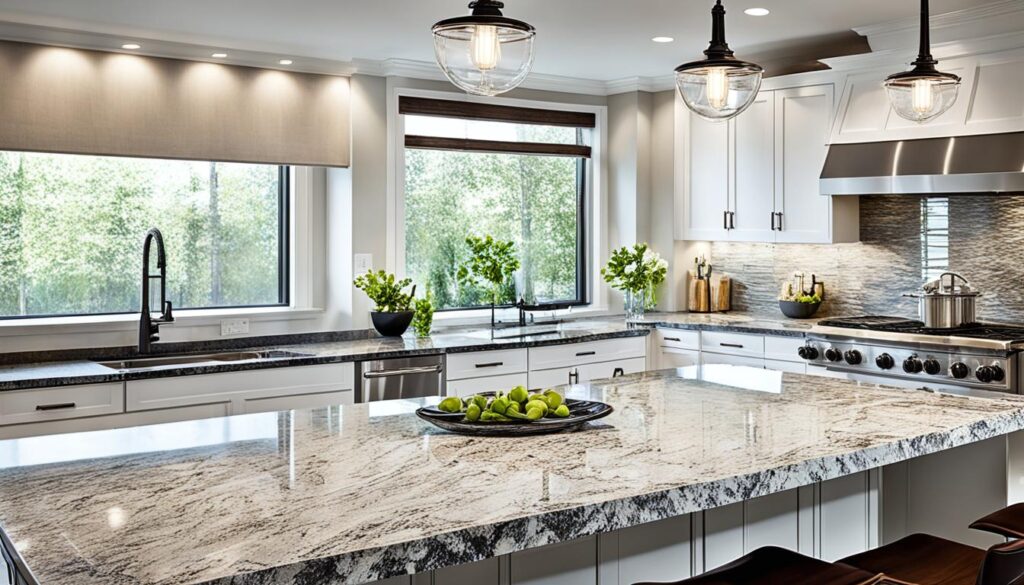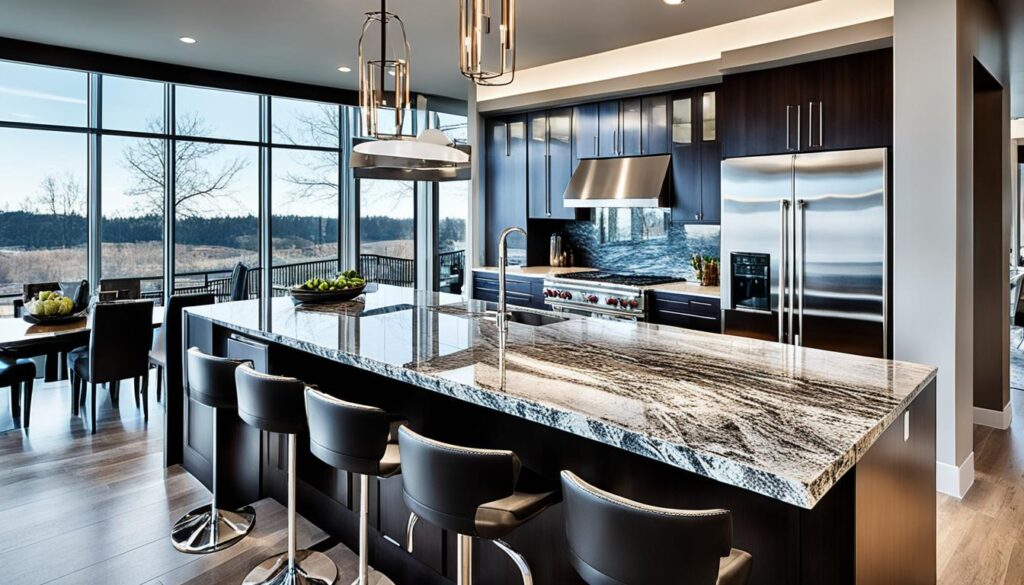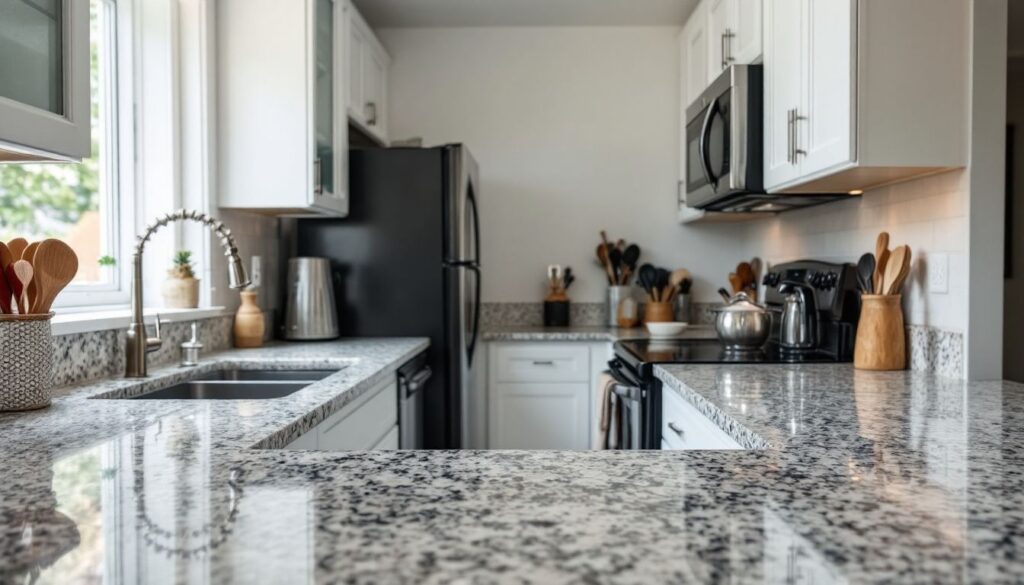Table of Contents
Choosing the right countertop for your kitchen or bathroom can feel like a tough puzzle. You want something stylish, durable, and within your budget. What are the pros and cons of granite countertops? This question often pops up during home remodeling discussions or when planning to build a new space. As someone who has gone through the process of selecting countertops, we’ve faced these same dilemmas.
We understand how overwhelming it can be to make such decisions, especially with so many materials available on the market. Granite is one of the most popular choices for countertops due to its beauty and durability. In fact, did you know that granite rates as one of the hardest materials available for countertops? That’s an impressive feat! Through thorough research and personal experience, we’ve gathered comprehensive insights into both the benefits and drawbacks of choosing granite for your surfaces. Our article is designed to ease your decision-making process by laying out all you need to know about granite tops.
Keep reading; you might just find what you’re looking for!
Key Takeaways
- Granite countertops are unique and durable. They look different in color and pattern, which makes kitchens beautiful. They can also handle hot things and sharp tools without getting hurt.
- You need to take care of granite countertops often. They must get a sealant put on them to stop stains, and you should clean them with the right products. This could cost more money over time.
- The cost of granite varies from $40 to $100 for each square foot, which might include putting it in place. Different types like quartz or marble might be cheaper or more expensive based on what they need for upkeep and how long they last.
Explanation of what granite countertops are
Granite countertops are made from natural stone. They come from deep in the earth. This makes each piece unique with its design and colors. People like them for kitchens because they look good and last a long time.
These countertops are tough. They can handle hot pots and sharp knives. Many homeowners choose granite when they update their kitchens. It adds beauty and value to their homes.
Pros of Granite Countertops
Granite countertops offer a unique look. Each piece is natural and one-of-a-kind. They are also scratch-resistant and very durable, making them ideal for busy kitchens. Plus, they can withstand heat well, so you can put hot pots on them without worry.
Unique and natural design
Granite countertops have a unique and natural design. Each piece of granite is different. It comes in many colors and patterns. This gives our kitchen surfaces an attractive look that stands out.
Many homeowners choose granite for its aesthetic appeal.
We appreciate that no two slabs are alike. The natural variations can add character to our space. These countertops work well in both modern and traditional homes, making them a popular choice among business owners too.
Their stunning designs can even boost the resale value of our properties.
Scratch-resistant and durable
Granite countertops are both scratch-resistant and durable. This means they can handle daily use without getting damaged easily. We can cut, place hot pots, and carry heavy items on them with confidence.
Their strong nature makes them a great choice for busy kitchens in homes and businesses.
The durability of granite is impressive. It lasts for many years with proper care. We appreciate how this material stands up to wear and tear over time. Knowing that our countertops will stay beautiful adds to their value as one of the popular countertop materials available today.
Heat-resistant
Granite countertops are heat-resistant. This means we can place hot pots and pans right on the surface without worrying about damage. The stone can handle high temperatures, which makes it great for kitchens.
We enjoy cooking and baking. A heat-resistant countertop allows us to work with confidence. It stands up well against the heat from ovens and stovetops, making granite a smart choice for our homes or businesses.

Cons of Granite Countertops
Granite countertops have some downsides. They can show seams where the pieces meet. They also need a sealant to stay safe from stains. Plus, they require regular care to keep them looking their best.
Want to know more about these drawbacks? check online guides or consult experts from Rock Solid Tops for advice tailored to your needs. Taking action now will lead us closer to achieving our dream spaces with stunning surfaces.
Visible seams
Visible seams can be a drawback of granite countertops. They occur where two pieces of granite meet. These seams may stand out and break the flow of the design. Even though skilled installers do their best to make them less noticeable, they can still be seen.
Homeowners and business owners should think about this issue. If we want a seamless look, we might need to choose larger slabs. This choice could help reduce the number of visible seams in our countertops.
Weighing the benefits and drawbacks is essential before making a decision on our granite countertops.
Importance of sealant
Granite countertops need sealant to protect them. Sealant keeps liquids from soaking in and causing stains. We must apply it regularly to keep our counters looking great. Without sealant, we might face issues like bacteria growth or discoloration.
Taking care of granite is important for its longevity. If we don’t maintain it properly, the beautiful surface can become damaged over time. Regular sealing helps us enjoy all the benefits of granite countertops while keeping up with required maintenance.
High maintenance
Granite countertops need regular care. We must seal them every year to keep them safe from stains and bacteria. If we forget this step, our beautiful countertop can get damaged over time.
Cleaning requires special products too. Regular soap may scratch the surface or dull its shine.
Costs add up with maintenance needs. This is a key factor when looking at granite vs quartz or other options. While granite seems tough, it demands our attention to stay in great shape.
It’s wise to think about these upkeep tasks before making a choice on countertops.
Factors to Consider when Weighing Your Options
When we think about granite countertops, cost plays a big role. We also need to consider how much care they need and the style that fits our space.
Cost
Granite countertops come with a range of costs. Prices can vary based on the type and quality of granite we choose. On average, granite costs between $40 to $100 per square foot. This price often includes installation but can increase based on the design and size of our kitchen or bathroom.
We should compare this cost with other countertop materials like quartz or marble. While granite may have a higher upfront cost, its durability might save us money in the long run.
Each material has different maintenance needs and lifespans. Evaluating these factors helps us make an informed choice for our homes or businesses.
Maintenance and care
Granite countertops need regular care. We must clean them often to keep them looking great. A simple soap and water solution works well for daily cleaning. Strong chemicals can damage the surface, so we should avoid using those.
Sealants are important too. They help protect granite from stains and moisture. Without sealing, spills can soak in and cause problems over time. We recommend resealing every year or as needed for the best results.
Regular maintenance keeps our countertops beautiful for years to come while enhancing their scratch resistance.
Design options
Granite countertops offer a wide range of design options. Each slab is unique with different colors and patterns. We can choose from light shades like white and gray to darker tones such as black or deep green.
This variety allows us to match our kitchen or bathroom style easily.
We also have different finishes for granite surfaces. Polished granite shines brightly, while honed finishes have a softer look. These choices help us create the perfect space that reflects our taste.
Exploring these designs makes selecting the right countertop an exciting part of our home improvement journey.
Installation
Installation of granite countertops requires careful planning. We need to measure our space accurately. This step ensures a good fit for the countertop. Professionals like Rock Solid Tops should handle installation due to the weight and size of granite slabs.
They have the right tools and skills.
We must also consider timelines. Installation typically takes one to two days, depending on the project size. It is wise to prepare our kitchen before they arrive. Clear out items from cabinets and surfaces so workers can move easily.
By doing this, we ensure a smooth installation process for our new granite countertops.
Lifespan
Granite countertops can last a long time. They often have a lifespan of 15 to 30 years, or even longer with proper care. This durability makes them a smart choice for homeowners and business owners alike.
We notice that many people prefer granite over other materials because it stands the test of time.
The lifespan depends on how we maintain our countertops. Regular sealing keeps them safe from stains and damage. Neglecting this step can shorten their life significantly. Choosing granite means investing in something strong and lasting, making it worth the effort to take care of it.
Conclusion
We have explored the pros and cons of granite countertops. They offer a unique look that can enhance any space. Durability is another great feature. Granite resists scratches and heat well.
Yet, we must face some drawbacks too. Seams can be visible, and they need sealing often.
Think about the costs when choosing your countertop. How much care are you willing to give? Will it fit your design style? We recommend looking at various options for installation and lifespan as well.
Granite may be a good choice if you value durability and beauty. Consider how these factors can improve your home or business space. For more information on other materials, explore different resources online! Take time to reflect on what fits best for you today!

FAQs
What are the pros and cons of granite countertops?
The pros of granite countertops include their unique look, durability, and heat resistance. The cons can be high cost compared to other materials, need for regular maintenance, and potential for staining.
How does granite compare with quartz or marble in terms of countertop material?
Granite has a natural beauty that makes each slab unique while quartz offers more color options and is less likely to stain than granite. Marble is softer than both materials which may lead to scratches but adds an elegant touch not found in many other stones.
Is there a big cost difference between different types of countertops?
Yes, the costs vary greatly depending on the type of material used for your countertop. Granite tends to be pricier compared to laminate or tile but cheaper than some high-end materials like quartz.
What kind of maintenance do granite countertops require?
Granite countertops need sealing every year or two to prevent stains from seeping into the porous stone surface; they also require daily cleaning with mild soap and water.

